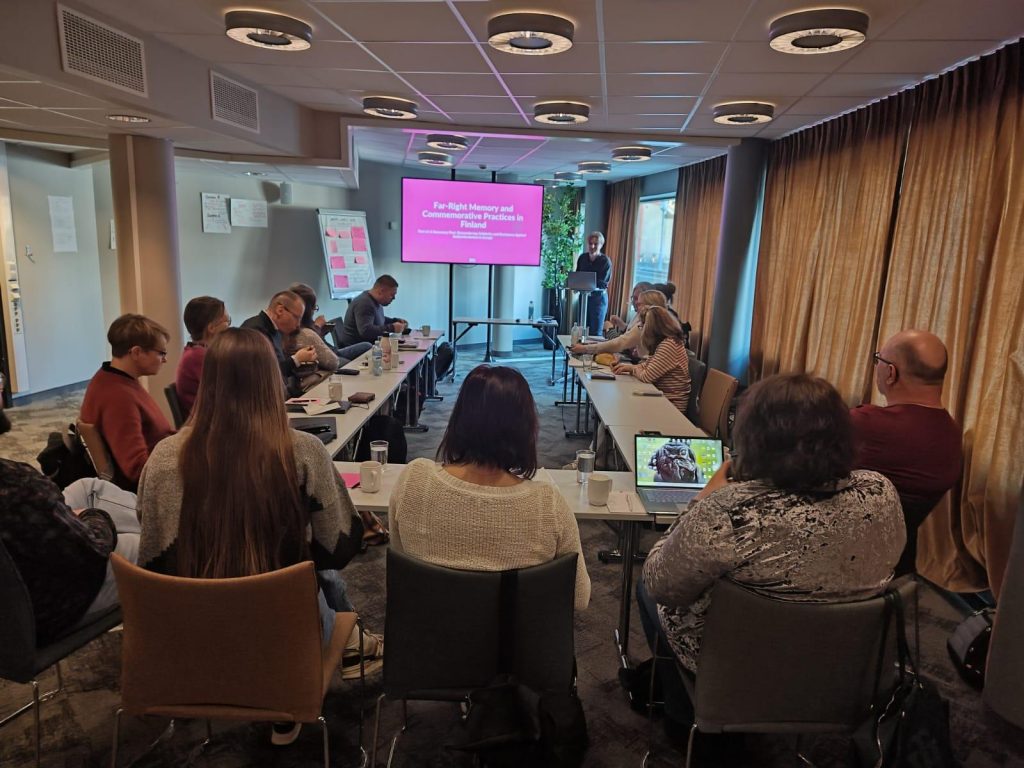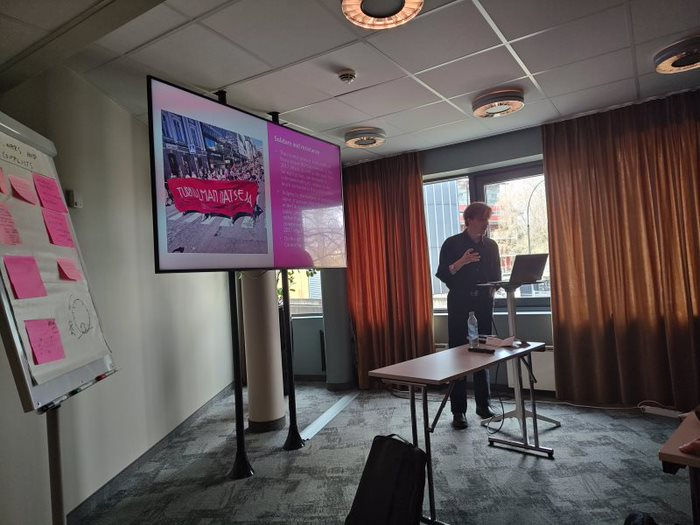Anti-Fascist Resistance
Overview
Rauhankasvatusinttituutti ry (RKI) organised the Memory Forum (2) titled Anti-fascist Resistance in Finland on 18th of April, 2024, presented by Robert Trygg, Assisting Coordinator in the SolRem project at RKI. The event began at 10.15 and lasted until 12.15. The audience consisted of eleven teachers working for international schools whom RKI has worked with and were interested in the topic, as well as two RKI staff members.
Agenda
| Event Programme Anti-Fascist Resistance in Finland18th of April, 2024, Anker Hotel 10.15-12.15 |
| Welcome |
| A theoretical framework: Far-Right Memory and Commemorative Practices in Finland |
| Resistance and Solidarity to Fascist and Far-Right Movements in Finland: the Case study of 188-Kukkavirta in Turku, Finland |
| Discussion |
| Conclusions |

The event began with a short introduction of the SolRem project and its international consortium. The beginning of the presentation included a short introduction to a theoretical framework on the Far-Right Memory and Commemorative Practices in Finland. It also consisted of a short description of the key findings of previous research reports, focusing on the themes and concepts in Report 3 on “Heritage Practices Concerning Far-Right Movements” and how these have been resisted in Finland. Visual material from different news was used to showcase the symbols which have ‘travelled’ through time and can still be seen today.
Rest of the presentation then concentrated on the Anti-fascist Resistance in the particular event known as “188-Kukkavirta” in Turku, Finland. On August 2017, two were killed and eight more were injured in a knife attack in Turku, Finland. Although the physical memorial for the victims was removed from public eye soon after, it still has a great deal of symbolic significance for different groups both locally and nationally. Since 2018, far-right groups have organised an annual event, better known as ”188-Kukkavirta”, to commemorate the victims of the attack. These are met with counter-protests by Turku without Nazis, a coalitian of several anti-fascist groups, which contest the far-right commemoration of the victims on the grounds that far-right activists are using the memory of the victims to propagate extremist views – a concern also shared by the City Council. The counter-protest Turku without Nazis shows that the memory of the 2017 attack, as well as the ways how far-right groups are involved in commemorating its victims, is very much contested in the public sphere.
Discussion
After the 45-minute presentation also with time for questions and comments, the audience engaged in a conversation about the Far-Right and disputed historical figures, places and events in their home places and countries as well as the political legacies of these, and how these are resisted today. The topics discussed ranged widely, often based on the audience member’s country of origin and even location in the country, including the past wrongdoings against indigenous people, effects of colonialism, American slavery, Civil War in Finland, Latvian complicated history last century, 22 July 2011 terror attacks in Oslo and Utoya Island, the Quisling government in Norway, and its geopolitical effect on Norway to this day. We also discussed the resistance to fascism, racism, and other -isms in general and how especially teachers, as this was the audience, can counteract and educate about complex issues and contested histories, and teach critical thinking skills. The discussion portion lasted for an hour.
The event ended with a short recap of the discussion main points and building ‘a politics of hope’ and how as right-wing parties are gaining ground in Europe, citizens across the continent show resilience and solidarity in their individual and collective responses to the rise of right-wing extremism.

